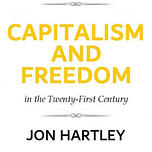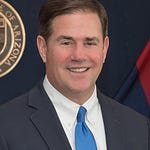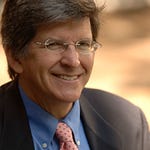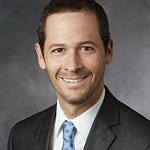Casey Mulligan, Professor in Economics and the College at the University of Chicago, joins the podcast to discuss how he got interested in becoming an economist from his days as an undergraduate at Harvard in Martin Feldstein's Ec10 class, being an economics graduate student and professor at the University of Chicago teaching the Chicago Price Theory approach, his experience working in the Trump Council of Economic Advisors (CEA), and the long-term influence of University of Chicago economics figures like Milton Friedman, Gary Becker, and George Stigler.
Jon: “Welcome to the Capitalism and Freedom in the 21st Century podcast, where we talk about economics, markets, and public policy. I'm Jon Hartley, your host. Today, I'm joined by Casey Mulligan, Professor of Economics at the University of Chicago's Department of Economics. It's a real treat to have Casey here. He is an expert in many areas of economics, and is perhaps one of the most famous advocates of Chicago Price Theory, something he'll get into in a little bit. He's also written many fantastic academic economics papers in so many areas of economics. We're so excited to have him on the podcast today.”
Casey: “Great, Jon. I like Capitalism and Freedom. I teach a class on socialism, so I kind of appreciate what the alternative is as well.”
Jon: “Well, we're really excited to have you here. I know you appreciate Friedman, along with many listeners here, along with myself, and part of why the famous 1962 book has given this podcast its name and a big part of the podcast is to sort of think about how maybe Milton Friedman would have thought about things in the 21st century, and also to maybe question what Friedman argued in much of the 20th century, and maybe rethink some of those arguments. I want to start by getting into your story, and talk about how you got interested in economics from the time you were an undergrad to when you came to the University of Chicago as a graduate student, and then as a professor. What began this lifelong passion and interest in economics?”
Casey: “I actually was a math major when I was a freshman, and the math professors didn't treat me that well. They weren't mean or anything, but they had other interests other than their undergraduates. And I had this other class called economics. Marty Feldstein was the professor of that. And even though he was obviously an important person, had the President Reagan's attention, but he still showed a lot of interest in my learning and my career, as well as my classmates. I thought, you know, maybe I should stick with this guy's class and what he's doing, and I grew to really like it.”
Jon: “I know Marty Feldstein has had so many students over the years, and certainly was well known as the inventor of public economics and a certain approach to economics, things like elasticity of taxable income. I think a lot of these things really go back to Marty. So I'm not surprised that he was a big influence on you and a big part of the beginning of your career. I think for many who have taught Act X over the decades, whether it's Marty Feldstein or Greg Mankiw or Jason Furman, now I think Act X has influenced so many people, whether they've chosen to become economists or not. There's, I think, a very long history there, and it's fantastic to learn that, Casey, you are part of that history. I want to flash forward to the University of Chicago here. You've written a book titled Chicago Price Theory on this very topic. And often whenever this topic of Chicago Price Theory comes up, there's always this question, what is Chicago Price Theory? How does it differ from standard graduate microeconomics? Often, I think most students outside of the University of Chicago learn their graduate microeconomics from MWG or Mass Collel, Winston Green, which is sort of the number one bestselling microeconomics graduate textbook of the past 30 years. But those graduate students at the University of Chicago have to take this thing called Price Theory, which I think in part, certainly Milton Friedman played a substantial role in teaching one quarter of that class, I believe, along with Gary Becker and others over the years in that period. Can you explain to the audience what Chicago Price Theory is?”
Jon: “Yes, we really, the course dates back over 100 years. Viner taught it in the 30s. As you said, Milton Friedman had an important role teaching it, Al Harberger, Becker, and Murphy. And it's very applied. It's not viewed as a mathematical exercise. You know, our intention is not to teach somebody how to construct a mathematical proof. We may encounter some proofs, but it's just part of understanding the applications. I mean, real world questions. You know, what's happening to labor share over time would be an example. What are the consequences of a corporate income tax? And so it has that applied orientation. You can read Viner's course from 100 years ago, and you'll see that same emphasis. The price theories emphasize markets, lots of people together. We get away from the alternative approach would be more emphasis on strategic interactions, small groups, monopoly, oligopoly, more of a game theoretic emphasis on strategy. Look at auction theory. I mean, in principle, auction theory can be very general and include lots of things, but in practice, there's just a good that comes from heaven and needs to be auctioned off, and there's a few bidders who are there, and we think about how they interact. In price theory, that would not be our emphasis at all. We'd want to know where does the good come from, what does it cost to make it, what are the substitutes in terms of resources for making that good. On the consumer side, what are they doing with that good, what are their alternatives? So we have really more of a market emphasis. We would not ever assume a fixed number of bidders on a good. There's a whole population of people who might purchase the good if it had the right properties and the right price. Chicago, you know, there's the price theory part. A lot of what I said could describe price theory more generally. The Chicago part would be also an emphasis on competition, partly for intellectual reasons that when we look at a competitive market, maybe simplifies things so we can focus on some other complexities that might be quite important, complexities on the technology side, maybe on the preference side. So you have, say, the Becker and Murphy rational addiction analysis. You know, they didn't spend a lot of time looking at oligopoly in that paper. You can't have an oligopoly for an addictive good, but the dynamics and the stock formation and habit formation, they wanted to focus on that, so they did it in a competitive framework. And we kind of do that over and over again. We have some chapters that deal with imperfect competition and monopoly, but really the emphasis is on taste and technology, especially technology, such an interesting topic. It changes a lot. So that would be our emphasis. As a result of these differences, one thing you'll see in a price theory book, including ours, you can see discussion of price controls, price regulations. MWG, 1,000 pages dealing with all kinds of issues, price controls is nowhere. And as you know, Jon, you worked on Capitol Hill, price controls is everywhere in policy. So it's a bit scary to me that we have so many people trained in economics, microeconomics, and aren't trained in price controls, and then they end up in Washington doing the price controls. And that would be an example of a big difference between micro and price theory in practice.
Jon: “Absolutely, and I think, you know, it's interesting too, you know, that there's, in many respects, I think a lot of these models don't actually involve utility functions, and that's sort of a bane of certain undergraduates. But it really just starts with the sort of concept of supply and demand, things that I think people can agree on, generally speaking, and building really simple models, which I think is a big part of the Chicago tradition. And it's also an honor that I've had to go to the Chicago Price Theory Summer Camp, something that is broadly open to graduate PhD students to go and to learn from yourself, from Kevin, Kevin Murphy, and others who are also passionate about the Chicago Price Theory approach, and learning really interesting applications of Chicago Price Theory, whether it's, you know, thinking about the supply and demand for oil, or housing, or many other topics. I know you have a paper out recently on opioid markets and opioid deaths. There's a number of applications, I think, to economics and social economics and many different fields. Anywhere, I guess, where you have sort of simple supply and demand frameworks. It's really interesting and a treat for myself to get to know and to work through some of those problems in your book as well. I think, certainly, Chicago Price Theory is something that people who are interested in that sort of simple Chicago approach might want to check out. And I know you have an upcoming revised edition of your book, Chicago Price Theory, as well, which you co-authored with Robbie Minn, Sonja Jaffe, and Kevin Murphy as well, something that people should check out when it comes out. So I just wanted to fast forward here a little bit to your time in government with the Council of Economic Advisors during the Trump admin. You also wrote a book about your experience called You're Hired. I'm curious, what was this experience like, having been, you know, an economist and professor at the University of Chicago, staying in the economics department for many years, and then going to government, going to Washington, and serving in the White House in the Council of Economic Advisers. What was that experience like? And as an economist, what did you find to be most interesting and, I guess, effective? Do people in government actually think about economics the right way in their mind, or are many people not thinking about incentives the way they should be?
Casey: Well, they were... Intellectually, it's very similar to my job as a Chicago professor, now that students were not 21 years old. They were maybe older. But it did a lot of the same things. Actually, the Chicago Price Theory was published while I was there. And I had the page proof on my desk, and I used them every day. One thing, when you're working in the White House, the president is the head of a massive organization. Too massive, but he's the head of a massive organization. He's dealing with the multiple fire hoses of information and questions and issues, and so are his staff. Like us. And what a valuable thing to have. Price Theory is a tool to organize all that stuff. So we could actually swallow all that water that the fire was putting out because we had the Price Theory to digest it. So I was really applying Price Theory. I think I actually made a bibliography of like 65 or 67 different things we put out in one year where we used Chicago Price Theory, and I show which pages we used. And the people in the White House loved it. I mean, they were happy that we were able to be so productive. They started to recognize patterns, you know, that maybe these health regulation issues are not so different than energy regulation issues, labor regulation issues. So that part was very similar. Now I had to wear a suit and tie. That's something I never do on a university campus. Had a beautiful office. It had a view of the White House. So the kind of superficial things were pretty different. The pay was low. But intellectually it felt quite similar. Another difference would be the president himself. He's good at publicity. You might have noticed that. He knows how to get millions of people to pay attention. And he loved what we were doing. He was always bringing attention, you know, 100x, 1,000x attention to our findings than we would ever be used to on our own. We put things on his Twitter. You know, things like, well, the drug CPI has fallen for the first time in 46 years, and that's got to do with deregulation. You know, regulation raises prices. Deregulation lowers prices. Things like that, he made millions of people see the results. So it was a very exciting time for me. It's part of the reason I wrote the book, to try to share that with people and also remember all the things that happened in a short period of time.”
Jon: “Well, that's fantastic to hear that you had such a good and positive experience working in D.C. And I know that not every economist that serves on CEA or goes to D.C. walks away with a similar sort of experience. You know, sometimes it's hard to get things done, but I'm glad to hear. I remember seeing some of these theories that you had put together of sort of the CPI subcomponents that have to do with drug prices and how they've fallen over this sort of period of DREG and I think around 2018. I know there's, you know, I think big changes, too, in terms of whether the government's being allowed to actually negotiate with Medicare prices. And it seems like there's a lot going on, too, just I think with widespread use of or greater use of generics. I think that that was a big part of that 2018 story. I guess here, you know, just also thinking about, you know, we have a lot of younger people and younger economists who are listening and are thinking about advice, whether it's thinking about doing interesting research or doing research that informs policymakers. Certainly a lot of your research is very policy relevant. And I'm sure that we also have a lot of listeners who are in Washington, D.C., working in Capitol Hill or elsewhere in D.C. I'm curious, what would be your advice to a younger self or to younger economists in terms of finding issues that are interesting to apply an economic perspective to or things that you think are not well studied or not well examined yet? I feel like you've worked on so many different issues that you'd be a perfect person to give advice to somebody who's younger. And I'm also curious, too, in terms of how people should think about their careers and what sorts of things, you know, they want some sort of a career in economics, whether that's in academia or policy. What are some, you know, sort of basic things that you recommend people do in trying to establish a brand of some form?”
Casey: You know, you get your diploma and hopefully the learning's not over. That's primary career advice that I would give and many people would have given. I heard Stephen Wolfram put it, he calls it a stack. And he's a computer guy. Maybe he's thinking about the insides of the computer. But he likes to think of his own career that way, that every year he was doing something that he could build on the next year. And so he's thinking of building up a stack, and in our profession, we call that human capital, but the advice is the same. You're learning things, you're gaining skills, and if you're in a position where you can use what you learned next year, and next year you build things you can use the next year, that I think is a great road to success, and I do get a little concerned about some of the younger people. They're jumping around. You know, part of it is you want to jump around to find what you're good at, and that I understand, but some of the kind of empirical approaches in our profession are like, well, I just happen to run across a status set, so I'll work on it, and then I'll be done, and the next year I'll be on to something else, and you're not building a stack, and I worry what position you'll be in middle age and older age if you haven't built a stack, so while it seemed like I've worked on a lot of different issues, and in fact, there was a set of basic skills price theory that I was developing, technological capabilities, econometric capabilities, so most of those projects made me better at the next one, even though it might appear as a broader topic that there's not a close relation.”
Jon: “Fantastic. And are there any, I know you're close with quite a few very famous economists in the Chicago tradition, whether it's from Gary Becker, Milton Friedman, you know, many others who are still there. Are there any particular, like, Gary Becker or Milton Friedman stories or pieces of advice or things that you remember about them that were particularly interesting or worth remembering in your mind or that influenced you in your journey as an economist?”
Casey: “I think I was influenced by Friedman, and Becker was too in many ways, but one common influence that we felt, actually going to the title of your podcast, Capitalism and Freedom. When Milton wrote that, those were kind of based on economic theory, an economic way of thinking, and the policies that came out were considered completely radical. Like, hey, let's not have the post office have a monopoly on delivering packages. Hey, let's have an all-volunteer military. Let's flatten the income tax. These were considered completely radical, politically infussable, and it was kind of a waste of time. And that was published, I think, in 1962, and within just a few years, these things started to happen, and we got a FedEx that was allowed, we got deregulation of airlines, we got an all-volunteer army in 1973. And Becker and myself, it kind of encourages us to kind of stick with the theory and don't be an amateur political scientist and say, you know, I'm not going to work on this because this policy is politically infussable. You know, the politics can change. The taste and technology and supply and demand, that basic logic is not going to change. You know, an example that Becker gave, a personal example he gave there, was around the draft again. Becker himself wrote a paper about the draft and the problems and why an all-volunteer system would be better. And he didn't send it in for publication because he thought it was just impossible. Within a dozen years of him throwing that in his drawer, it became possible. He was kicking himself. And I had a similar instance in my own career where I was working on teaching public economics and thinking about government programs that are in-kind rather than paying money. And one of the things economic theory says, you know, you can't really have an in-kind program if you can resell the things. So you can understand Medicare has hospital visits and doctor visits. You can't really resell your hospital bed that easily, so it kind of works. But at the time, this was the 90s, the Senate and the House were talking about adding drugs to the Medicare. We're like, wait a second, drugs you can resell. Your hospital bed you can't resell, but drugs you can resell. Grandmothers are going to turn into drug dealers. And I thought, no one in Washington is going to listen to me about that. In fact, no one in academia is going to listen to me if I'm going to say grandmothers are going to become drug dealers. And so I dropped it. And I really regret doing that because the economics was very clear. And what happened within a few years, we got Medicare Part D, and immediately you had a few grandmothers, not many, but in high volume, were selling drugs that their government was buying for them at a low price. And they were turning around selling them at a high price. And people died from that. So things can change. What you think is acceptable to talk about in the policy realm or in the academic realm can change pretty quickly. And it makes sense to stick with your principles. And Milton did that in the Capitalism and Freedom.”
Jon: “Absolutely. And to think about just how many of these topics are, I think, newly relevant again today. You're absolutely right. How prescient that account was in 1962, Capitalism and Freedom, when only a few decades later, you got an all-volunteer military in the U.S. And then on top of that, things like you also had the Reaganomics revolution, and not only Reaganomics, but you also had JFK, who slashed the top income rate substantially. And the top income rate went from, with the JFK and Reagan tax cuts, from the top marginal rate was close to 90%, and was brought all the way down to the 30s, where it's sort of sat in recent decades. You know, we haven't gotten a flat tax. Some Eastern European countries did end up getting flat taxes after the fall of the USSR, and a number of people like Bob Hall and others, I think, were influential in promoting flat taxes, and certainly in countries that sort of didn't have maybe great institutions and great rule of law, and perhaps it made a lot more sense, you know, also in places like Hong Kong, for example, where flat taxes have been successful. I'm curious, like, about your thoughts about sort of the future here, and sort of the legacy of capitalism and freedom. You know, there's a lot of topics that were written in that book that sort of have a lot of renewed interest right now, whether, I think, you know, occupational licensing is very much a topic of interest right now. You know, scholars like Morris Kleiner have been working on it for decades, but I feel like now quite a few scholars are interested in this topic. And then you also have other things like income share agreements, and the whole challenge of rising costs of going to college, you know, which have become astronomical, and thinking that maybe there's better approaches than simply, you know, fixed rate student debt that's being subsidized by the federal government. Income share agreements in recent years were sort of thought of as, you know, a potential solution to mitigate that issue and have sort of better incentives on both the part of the student and maybe having better accountability in the sense that, you know, that there's sort of an aligned incentive to find majors that maybe have better outcomes. And, of course, this is all before sort of blanket student forgiveness that occurred last summer. But I'm curious, what do you think about the legacy of capitalism and freedom in the 21st century? Obviously, the discipline has moved quite a bit, I think, away from Friedman, in some respects, but I'm curious about his ideas back then, and do you think that they're sort of newly relevant today? And if so, how and in what areas do you think they might be relevant again?”
Casey: “You know, Milton Friedman wrote me a couple letters, one of them I'm remembering now, about my paper. And he said, you know, Casey, you're politically naïve. The economics is fine, but you're politically naïve. Now I think back, it kind of cracks me up because actually he was projecting a little bit that he was maybe a little politically naïve. His view, especially earlier in his career when he wrote that book, was if he can just educate enough people about economics, we can change policy. And a more Stiglarian view, after George Stigler, would be, no, we have these policy so-called mistakes. There's a reason for that. It's a political equilibrium of some kind. And it's not a matter of a lack of economic education or people's incentive not to acquire that education, let's say. And this is kind of an intellectual battle within our department. And I think Friedman, a lot of it rubbed off on Friedman, although he still, at the very end, still appreciated economic education. And so it's not zero weight on that, but still. And so I think what you see in some of the things in Capitalism and Freedom, they were successful because their economic gains were high. But it also wasn't a political equilibrium to stay with a kind of a flat tax. And so loopholes got introduced again, especially after the 1986 reform. And I think even later in his life, Friedman wrote some Wall Street journal’s saying, you know, there's a lot of, the politicians have a lot of interest to poke holes in the flat tax in order to be important and to get their constituents' attention. So I think that's partly why you see a pendulum swinging, that the political equilibrium with our current institutions is not total freedom. And you get in periods where the lack of freedom is too costly, and we move in the direction of more freedom. But again, that's not a permanent equilibrium, so we move back toward the less freedom. That's kind of the way I think about it, and it kind of follows Milton's own intellectual history.”
Jon: “Yeah. And so, such a fascinating point, and I think more about things like vouchers, school vouchers, and charter schools, which are also very much a big topic today in educational reform circles. There are so many issues that Milton Friedman talked about that I think are newly relevant, and perhaps all the more reason to turn back to some of these older ideas, which may be newly relevant again, and all the more reason to pull out not only Milton Friedman's old price theory textbook, but also your Chicago price theory textbook, which again, a revised version is coming out soon. Thank you so much, Casey, for joining us today. This is the Capitalism and Freedom in the 21st Century podcast, where we talk about economics, markets, and foreign policy. I'm John Hartley, your host. Our guest today was Casey Mulligan, a professor of economics at the University of Chicago's Department of Economics. Thank you so much for joining us.













